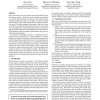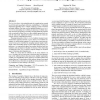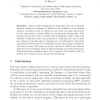57 search results - page 10 / 12 » Data caching, garbage collection, and the Java memory model |
ASPLOS
2011
ACM
12 years 11 months ago
2011
ACM
nt, user-defined objects present an attractive abstraction for working with non-volatile program state. However, the slow speed of persistent storage (i.e., disk) has restricted ...
POPL
2009
ACM
14 years 2 months ago
2009
ACM
With the emergence of commodity multicore architectures, exploiting tightly-coupled parallelism has become increasingly important. Functional programming languages, such as Haskel...
ASPLOS
1994
ACM
13 years 11 months ago
1994
ACM
In the past decade, processor speed has become significantly faster than memory speed. Small, fast cache memories are designed to overcome this discrepancy, but they are only effe...
IWMM
2009
Springer
14 years 2 months ago
2009
Springer
Tracing algorithms visit reachable nodes in a graph and are central to activities such as garbage collection, marshalling etc. Traditional sequential algorithms use a worklist, re...
ICCS
2003
Springer
14 years 27 days ago
2003
Springer
Object oriented languages, in particular Java, use a frequent dynamic dispatch mechanism to search for the definition of an invoked method. A method could be defined in more than...



